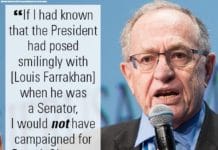Listen to the interview and read the transcript
by Minister of Information JR

I wanted to talk to him about the politics surrounding the lack of Black talk radio program directors and Black talk radio hosts in the mainstream radio industry. Here’s our Q & A …
M.O.I. JR: Can we talk about you being one of few Black program directors in the country? We were talking a little off air, and you were telling me that you met one other guy. What has that experience been like?
Rob Redding: Well, it’s definitely a different experience. I can say that I have dealt with a lot of challenges that are typical of being a Black (person), of course, and then in any industry groundbreaking just the normal stresses and strains of being a program director and/or a talk show host are just coming with the job. But there is an extra layer, of course; being Black in America is always difficult.
This is not our America. It’s gotten a lot freer and fairer, but it is still a work in progress, and the struggle continues. So it’s been a struggle. You know just the normal hurdles of being a program director, but it’s been an extra struggle especially being 30 minutes away from Jena, Louisiana, home of the Jena 6, and having all of that history, that baggage, and race being an issue in this area of the country.
M.O.I. JR: How do you look at it in the industry of radio? You being a program director, you’re very much in the hierarchy in management of radio stations in the United States. Why would you say there isn’t too many Black program directors or I should say Black talk programs in the country, in relation to how many music programs there are or in relation to talk radio for other nationalities or other ethnicities?
Rob Redding: Racism. It is very simple. You know, it is easy to say the r-word, but the fact is, there are lots of Black talkers out there and there are a lot of Blacks at Black talk stations, but they haven’t been given the opportunity in mainstream America. I’m one of the few people who have been given an opportunity in mainstream America to have a talk show on a number of mainstream or white stations.
And when you have very few Blacks in a mainstream industry – not just on Black talk radio, but on a mainstream talk radio station – you are going to have very few program directors that are African American. And the only other Black program director that I know of – I’ve been asking everybody in the industry that is over a mainstream (station) right now – is Rennie Bishop, and that was a Black talk radio station in New York for years and now it’s running Air America, and it just happens to be mainstream now.
So other than that, when it is not running Air America, it’s a Black talk station. So it’s still really a Black talk station. So the point is, if you don’t have Black talent behind the mic as a talk show host nationally syndicated or just mainstream, then it is very likely that you are not going to have Blacks in programming for those radio stations.
M.O.I. JR: How do you think that affects the Black community – one, with you being a program director and you understanding the power of being a program director, but two, with you being a national broadcaster that broadcasts on XM and is syndicated all over the country – how does that affect the listeners, in particular when there is not enough Black talk programming? And how does it affect the Black community, specifically?
Rob Redding: Well, I think it has a profound effect on the Black community, and one of the reasons why I took this job – it’s not like I’m making a whole lot of money – is to make a statement, OK. It’s to make the statement that, first of all, there is a void. And it needs to be filled. I don’t want to be the only one. I don’t want to be, at this time next year, the only person in talk radio that is programming a mainstream station.
I’ve made attempts to make sure the industry know that there is a void, but I’ve been told by some of the people in the industry that “that makes us look bad, Rob.” Well then, do something about it. Well, not any more.
Those are the two responses that I have. One, do something about it: Put more Blacks who are in talk radio – they are just doing “Black” talk radio because they haven’t been given a chance on mainstream talk radio – put more in the industry and give them an opportunity to program these stations.
And number two, no it doesn’t make the industry look bad, because now I’m doing it and now you’ll give others a chance to do it, so that means you’re dealing with the issue; you’re not just ignoring it. You’re not saying, “We’re not going to talk about it, because it will make us look bad.”

So the point is, is that those people are not being served. They are not being served with a perspective of the people that are listening to the radio. And that is what I hope to do to change that for our people. And I think that that is going to benefit not only our people, but the industry. It will diversify the industry.
M.O.I. JR: You hit a little bit on the economics of it. Does Black talk radio get the ratings to compete on a national scale as, say, other talk radio?
Rob Redding: No. No, because we’re stuck on buffoonery. We’re snapping our fingers, popping our joints in and out of their sockets. It’s one of the things that we like to do. It’s good, it’s easy listening, and that’s what corporate media has projected on to us, and we’ve embraced it.
So no one wants to think, and no one wants to really dissect issues any more. The Civil Rights legacy that we could be so proud of in this country, that has brought us so far and has brought us the likes of Barack Obama, who is good as an image to Black people. But unfortunately, we’re trying to force him every single day to live up to the promise that the Civil Rights Movement actually gives to the Black community so we don’t have to continue to “struggle” more than anybody else in America. But I digress.
The point is, at the end of the day, we have to really look at the fact that one of the reasons why Black talk radio is not successful is because people don’t want to think. And corporate media types have been able to project this on the society, because hip hop has been defining success for our young people.
And until we make thinking cool again, people are not going to want to listen to people pontificate on the issues of the day because they feel like there is no money in that. There is no bling-bling behind that.
But with Black talk radio, what we will see – because it is a little bit behind mainstream radio; mainstream radio is just now jumping the dial – talk radio is jumping the dial to FM, and it is going to be a while. I mean, we got one of the first Black talk radio stations to jump the dial to FM, is WGIV out in Charlotte. They bought an FM translator; they are now on FM. So once we see these formats start to jump the dial, look for them to start doing better in the ratings, and doing better in terms of performing in terms of a Black talk format.
M.O.I. JR: Instead of blaming the people, don’t you have to put more of the blame on programmers, because what they are doing is programming audiences?
Rob Redding: Well yeah, and they’re being paid by the corporate elite. I agree; it is definitely the program directors’ fault. If you are the program director, you are giving the people “what they want.” You’re also giving the corporate suits what they want.
You know, if they tell you that everybody is playing the Jay Z record – they being the corporate elite or the suits in the company – and they’re pressuring you to play the Jay Z record, then you know everybody is loving New York and the “Empire State of Mind.” That’s the way it is going to work at your particular station, because you’re being pressured into it. So definitely the program directors are responsible for the content that airs over their station.
M.O.I. JR: Where do you think Black talk radio is going? Is there an upside to Black talk radio, because I know you operate Blacktalkers.com? Is there any good news dealing with Black talk radio?
Rob Redding: Well GIV is one of the ones that we are watching very closely that has made the jump. There are a couple of other – I believe FMs – that are doing some talk on the FM dial. They are doing music too, but no one is just solely doing talk, mainly because the content is not out there.

If he is not a Black guy to you, or to any one else that is listening, he professes to be Black and we’re claiming him these days so that might be news to some people. So because of the history that we have, the one drop rule – it’s not our rule; it is their rule – in the Plessey v. Ferguson one drop rule that they have in stated a long time ago, he by default is “Black” because he is tainted with Black blood.
OK, well, fine. Since most of us have embraced that, that he is Black, that means that Black issues are what? Hot. And because they’re hot, the only people that really understand these issues, with any sincere point, I believe, are people that are within the community.
Rush Limbaugh cannot tell me about being Black. Sean Hannity cannot tell me about being Black. He can’t tell me about my Black president, as far as I’m concerned. But the people that can are the people like Warren Ballantine. The people that can are people like Rob Redding.
Why am I still looking at Rush Limbaugh telling me about Barack Obama on CNN, on Fox News, on MSNBC, talking about he wants Barack Obama to fail? Some would say of course he does, because he is a white guy and he is a Black guy. Well, that’s an easy enough comparison to make. The point is that having Blacks pontificating on issues and Black talk radio is needed more than ever because we have a Black guy, and a Black wife, with Black kids in the White House.
M.O.I. JR: Let me ask you this: Some would argue that what is happening in America, and what we can unarguably say happened in Latin America and Africa, is what is called neo-colonialism. So let me bring that back to right here in this radio station. I am recording this right now at KPFA radio station in Berkeley, California. And KPFA does not have a Black public affairs show.
Now, that doesn’t mean that they don’t have Black talk show hosts. That means that those Black talk show hosts do not claim to be and are not of the Black community. Now, how do you see that being played out, because that is one game that our Black program director, who does not identify particularly with the Black community or the issues of the Black community, how do you see this being played out, because that is the game that is being played in 2009?
Rob Redding: Well, I think that that is the wrong game. I don’t believe in this post-racial fantasy that people keep touting. I don’t believe in it for KPFA. I don’t believe in it for the USA, and I don’t believe in it for the entire world, because I believe that everything comes down to race, in America and the world.
M.O.I. JR: I am recording this right now at KPFA radio station in Berkeley, California. And KPFA does not have a Black public affairs show. Rob Redding: They don’t want to see us be able to say what we think about issues of the day. I believe that everything comes down to race. We’ve got to deal with the specific problems relative to the Black community.
I believe that we’re in a situation – we’re in a dangerous situation – where if we believe that we can continue to ignore the ills that happen within the African American community specifically, if we believe that we can let Rush Limbaugh, Sean Hannity and the rest of these folks pontificate and talk about what we should all being doing in America and we want Barack Obama to fail, no. What I want Barack Obama to do is, that I want him and I want others to realize: One, we don’t live in a post racial fantasy like they do. They may have arrived, but we haven’t arrived, OK.
And I want them to realize, Barack Obama included, I want them to realize that we’ve got to deal with the specific problems relative to the Black community. We can’t just have healthcare for all people and go, “That goes for Black people too, so it helps them to.” We can’t just say, “You know what: We’re going to give severance checks to people, and that’s going to help people equally across the board, and that’s going to bring down the nearly 20 percent of Black people that are unemployed right now.”
No, we need special care and attention. There are special issues relative to the Black community that cannot just be dealt with by dealing with everyone the same way. We are not all in the same place. You do not treat a triage patient at a hospital who has serious, serious injuries the same way that you treat someone who has a paper cut. You don’t.
There are special issues relative to the Black community that cannot just be dealt with by dealing with everyone the same way. You do not treat a triage patient at a hospital who has serious, serious injuries the same way that you treat someone who has a paper cut. You don’t.
M.O.I. JR: Right. Being a programmer on XM Radio, do you see national radio and satellite radio being the next frontier or do you see it being just as racist as terrestrial radio? And where do you see us as Black talk programmers in the next five to 10 years? What are your projections?
Rob Redding: The future is bright. I think that if satellite radio is able to hold on, I don’t think that it poses the threat that some terrestrial folks will say that it does. I think that people have to be able to afford the technology. Anytime that you tell people that they have to pay for television, there is still a lot of people that are not paying for television, that get it for free and they don’t have cable. So my point is, a lot of people won’t be able to afford radio, and won’t be able to pay for it, especially during such austere fiscal times.
My point is, is that I believe that it has a future as a matter of fact. I believe it will be a kind future to African Americans – Blacks – because what we have seen with XM 169, The Power, which I am heard on, at least they were the first national network to embrace Black talk and say, “You know what? We need to have Black talk show hosts doing Black talk.”
So I think that the future is bright in alternative media. And I put XM and satellite radio and Sirius in that realm. So I think the future is bright, and I think that it’s important also – the web. I know that it is important to me with spreading news with ReddingNewsReview.com and with my show, streaming, all of that.
Those are going to be important for us to embrace. Podcasting – to create our story, to tell our story about what is going on in our community and to pontificate and to give analyses on that, because you know that is what people don’t want to see us do. They don’t want to see us put down our own word and our own thoughts in newspapers. They don’t want to see us be able to say what we think about issues of the day.
M.O.I. JR: Why?
Rob Redding: Because there is power in that. There is power in being able to tell you not only what happened, but what it means.
Email POCC Minister of Information JR, Bay View associate editor, at blockreportradio@gmail.com and visit www.blockreportradio.com.

 Store
Store












